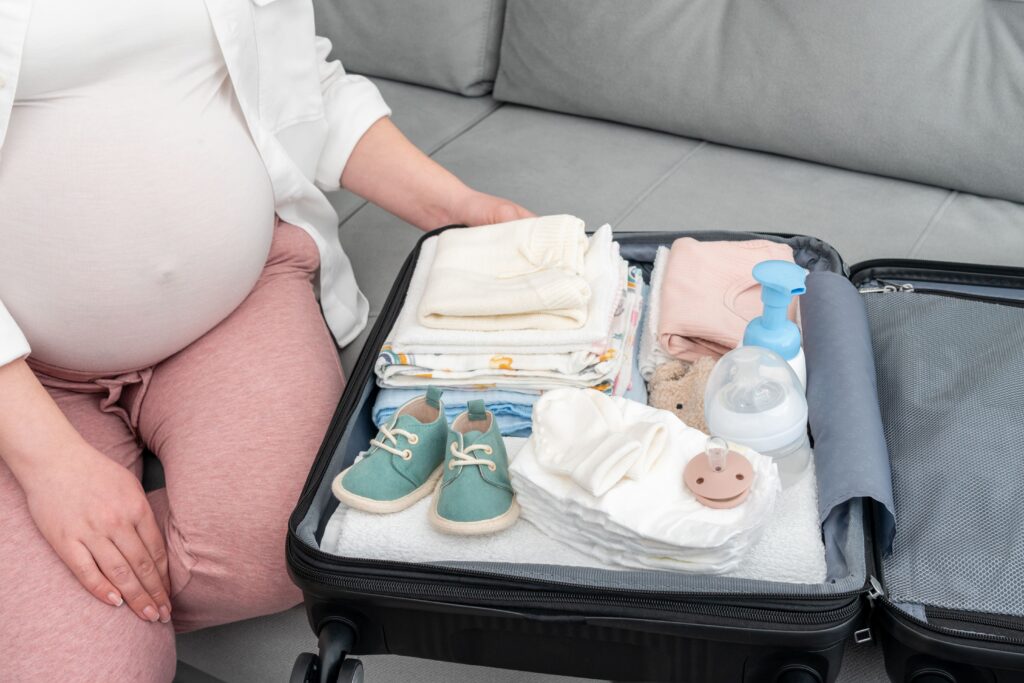Starting your journey as a mom can be both exciting and scary, especially if it’s your first time. You’re stepping into a new world, and it’s important to be well-prepared. But, where do you start?
This guide is here to give you the key pregnancy tips every first-time mom in the United Arab Emirates should know. We’ll cover everything from your health needs to handling the emotional changes. We want to help you make the most of this special time. So, are you ready to start this amazing journey? Let’s get started!

Key Takeaways
- Prioritize your health and nutritional needs during pregnancy
- Develop a realistic self-care routine to manage stress and anxiety
- Explore financial and practical preparation for the arrival of your little one
- Utilize parental resources, such as books and prenatal classes, to feel empowered
- Prepare for the final stretch by creating a personalized birth plan and packing your hospital bag
Understanding Your Health Needs
Keeping healthy during pregnancy is key for you and your baby. As a first-time mom, knowing about health matters is vital. We’ll look at how to keep you well through good eating, exercise, and fitness.
Proper Nutrition and Dietary Changes
Eating right is crucial for a healthy pregnancy. Moms-to-be should eat lots of fruits, vegetables, lean proteins, and complex carbohydrates. These foods help meet your body’s extra needs. Talking with a healthcare provider can help with issues like weight gain, morning sickness, or gestational diabetes.
Exercise and Fitness During Pregnancy
Exercise is great for pregnant women from the fourth month of the pregnancy if the mom does not find any medical complications. It helps with back pain, boosts energy, and improves sleep. Try to get at least 150 minutes of moderate exercise each week. This can be walking, prenatal yoga, or swimming.
Always check with your healthcare provider to make sure your exercise plan is safe and right for you.
“Staying active and nourishing your body can make a significant difference in how you feel during pregnancy.”
By focusing on your health and making the right changes, you can have a better pregnancy. Remember, your healthcare team is always there to help you.
Dealing with Physical Discomforts
Pregnancy is a thrilling journey, but it also has its challenges. As a first-time mom, being ready and having strategies is key. This helps manage common physical issues.
Morning sickness is a big issue for many. It can happen any time, making everyday tasks hard. To ease it, try ginger, crackers, or eating small, frequent meals. Drinking plenty of water is also important.
Swelling is another issue, often in the feet, ankles, and hands. It’s due to more blood flow and fluid retention. To reduce swelling, elevate your legs, wear comfy shoes, and cut down on salt.
Back pain is a common problem for pregnant women. Good posture, gentle exercises, and maternity belts can help. If it’s bothering you, talk to your healthcare provider about safe ways to ease it.
Remember, every pregnancy is different. What helps one mom-to-be might not help another. Keep talking to your doctor and don’t hesitate to get support from loved ones or prenatal groups. With the right approach, you can handle these physical issues and enjoy the journey.

“Pregnancy is not a disease, it’s a time to heal, to connect and to grow.” – Demi Moore
Preparing for Emotional Changes
Pregnancy is a big journey, full of ups and downs for first-time moms. From excitement to anxiety, expectant parents face many emotions. Understanding these feelings and building a support system helps manage stress and anxiety.
Managing Stress and Anxiety
Feeling stressed and anxious during pregnancy is normal. Hormones, discomfort, and the unknown can cause many emotions. First-time mothers can try relaxation techniques like deep breathing or yoga to help.
Self-care, such as taking a warm bath or going for a walk, can also help. If stress is too much, seeing a mental health professional is key. Counseling or support groups can offer comfort and advice from others in similar situations.
Building a Support System
Having a strong support network is crucial during pregnancy. Pregnant women should talk to their partners, family, and friends for help. They can offer emotional and practical support, making pregnancy easier.
First-time mothers might want to join prenatal support groups online or in person. These groups let you connect with others, share stories, and learn from their experiences. Local resources like childbirth classes and lactation consultants can also help with pregnancy and after.
By focusing on self-care, getting professional help when needed, and building a strong network, expectant mothers can prepare for pregnancy’s emotional changes. This helps them face the journey ahead with confidence.
Financial and Practical Preparation
Having a baby is exciting but also brings many practical and financial challenges. As a first-time mom, getting ready for these aspects of parenthood is key. This means budgeting for medical and baby expenses and planning for household tasks. Being prepared can reduce stress and make this big change easier.
First, look into the costs of pregnancy must haves and baby items. This includes medical bills for prenatal care, delivery, and aftercare. You’ll also need to think about buying things like cribs, car seats, strollers, and clothes. Plus, consider maternity leave, childcare options, and support services to plan for your finances.
It’s also important to plan for your daily life during pregnancy and after the baby comes. Think about meal prep, cleaning, laundry, and setting up the baby’s room. Getting your home ready and organizing tasks can help you focus on pregnancy self care and spending time with your baby.
Getting ready financially and practically means doing your homework, planning, and talking with your partner or support network. Understanding your needs and making a solid plan can help you enjoy the journey of parenthood. You’ll feel more confident and at ease.
| Expense Average | Cost |
|---|---|
| Prenatal Care | $2,000 – $5,000 |
| Delivery | $10,000 – $30,000 |
| Newborn Essentials | $3,000 – $6,000 |
| Childcare | $10,000 – $20,000 per year |
“Preparation is the key to a smooth transition into parenthood. Take the time to plan ahead, and you’ll be able to focus on what really matters – bonding with your new little one.”
Learning and Using Parental Resources
Being a first-time mom can be both thrilling and a bit scary. Luckily, there’s a lot of help out there. Pregnancy books, online guides, and prenatal classes can give you great advice and support.
Pregnancy Books and Online Resources
Today’s pregnancy books and online tools offer a lot of info. You can find everything from how your baby grows to how to recover after giving birth. Sites run by doctors and moms who’ve been there offer pregnancy tips for first-time moms. They also provide a pregnancy guide to explain the changes you’ll go through.
Mobile apps are another great way to keep up with your baby’s growth and your health. They let you track your baby’s development and get pregnancy advice for first-time moms anytime.

Attending Prenatal Classes
Prenatal classes are a smart choice for first-time moms. They cover everything from what you need for pregnancy to caring for your newborn and breastfeeding. In these classes, you’ll learn from experts, ask questions, and meet other moms-to-be.
This can make you feel more ready and confident for your baby’s arrival.
Using all the resources available is key to a great first pregnancy. By checking out pregnancy books, online pregnancy guides, and going to prenatal classes, you’ll be ready and supported as you start this new chapter.
The Final Stretch: Preparing for Delivery
As your due date nears, making a detailed birth plan is key. This plan should cover your pain relief choices, who you want in the room, and any medical procedures you’re okay with or not. Talk about your plan with your healthcare provider to make sure it fits hospital rules.
Creating a Birth Plan
Having a birth plan helps you feel more in charge and informed. Think about adding these parts to your plan:
- Your preferred pain relief, like an epidural, breathing exercises, or natural methods
- Who you want in the room, like your partner, doula, or family
- Your views on medical procedures, such as fetal monitoring, episiotomy, or cesarean section
- Your choices for right after birth, like skin-to-skin contact and delayed cord clamping
Packing Your Hospital Bag
Getting your hospital bag ready early can ease your mind in the last weeks of pregnancy tips for first time moms. Include clothes, toiletries, and special items for you and your baby. Don’t forget important papers, snacks, and things to keep you entertained.
| Items for Mom | Items for Baby |
| Comfortable clothes(robe, slippers, nursing bras) | Clothes (onesies, socks, hat) |
| Toiletries (toothbrush, toothpaste, shampoo, deodorant) | Blankets and swaddles |
| Sanitary pads and disposable underwear | Diapers and wipes |
| Snacks and water bottle | Baby toiletries (gentle soap, lotion, diaper rash cream) |
| Entertainment (book, magazine, chargers) | Car seat |
With a birth plan and packed hospital bag, you’ll feel more ready and in control as you get closer to pregnancy guide and pregnancy self care for your delivery.

Conclusion
Pregnancy is a unique journey filled with joy and challenges. It’s important to focus on your health and get ready for the emotional and practical changes ahead. With the right resources, you can feel more confident as a first-time mom.
Learn about your nutritional needs and how to manage any discomforts you might feel. Don’t forget to seek advice from healthcare professionals, family, and friends. Remember, every pregnancy is different. Be patient with yourself and ask for help when you need it.
Use this time to connect with your growing baby and find resources to help you prepare for parenthood. Enjoy the moments leading up to your baby’s arrival. With the right mindset and tools, you can face pregnancy’s challenges and look forward to welcoming your new baby.
FAQ
What are the essential tips for first-time pregnant women?
First-time moms should eat well and stay active safely. They should manage their physical changes and prepare for emotional shifts. It’s key to build a strong support network and learn about parenting resources.
Creating a birth plan and packing a hospital bag early are also crucial steps.
How can I ensure proper nutrition and fitness during pregnancy?
Eating a balanced diet full of whole foods is key during pregnancy. Include fruits, veggies, lean proteins, and whole grains. Exercise like walking, prenatal yoga, or swimming can ease pregnancy discomforts.
Always talk to your healthcare provider to make a safe exercise plan that fits your needs.
How can I deal with physical discomforts during pregnancy?
Pregnancy brings many physical changes, like morning sickness, swelling, and back pain. Talk to your healthcare provider for safe ways to ease these symptoms. Don’t be shy about asking for help from loved ones or prenatal support groups.
How can I manage the emotional changes during pregnancy?
Pregnancy can be emotionally challenging, with feelings of excitement and anxiety. Use coping strategies like relaxation techniques and self-care. Don’t forget to lean on your support system, including your partner, family, and friends.
If you need more support, consider talking to a mental health professional.
How can I prepare for the financial and practical aspects of parenthood?
Getting ready for parenthood means planning for your finances and practical needs. Look into medical costs, baby gear, and childcare expenses. Make a household plan for meals, cleaning, and organizing the baby’s room.
Check out maternity leave, childcare benefits, and support services to feel more prepared.
What resources are available to help first-time moms during pregnancy?
There are many pregnancy books and online resources for first-time moms. Look for reputable websites, apps, and books by medical experts. Prenatal classes are also great, covering topics from childbirth to caring for newborns and breastfeeding.
How can I prepare for the delivery process?
As your due date nears, make a birth plan with your preferences and expectations. Include your pain management choices, support people you want there, and any medical interventions you prefer or don’t prefer. Packing your hospital bag early can ease your mind in the last weeks of pregnancy.
